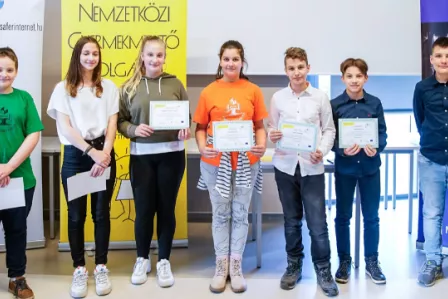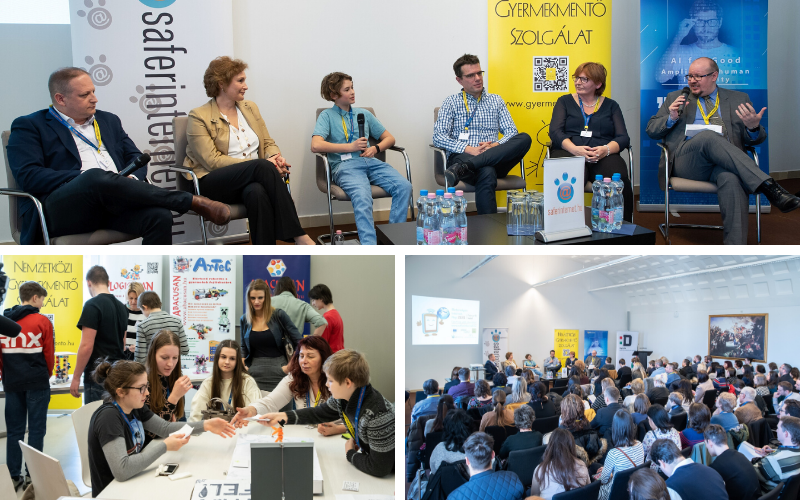The Hungarian Safer Internet Centre (SIC) introduced the Hungarian agenda for the Safer Internet Day (SID) initiative at a press conference held together with the National Cybersecurity Institute of the National Security Service and the National Police Headquarters.

The International Children's Safety Service (ICSS), which leads the Hungarian SIC, organised an awareness event at the National University of Public Service, attended by education professionals, decision-makers, teachers, children and others. The organisers invited the Hungarian interested parties, such as child protection experts, game experts, web security experts, telecommunication companies, internet service providers (ISPs), non-governmental organisations (NGOs) and multinational company representatives, to the event.
During the event, experts in the field discussed what they think is positive and exemplary online behaviour for children and what can be considered useful or harmful for them. Participants had the opportunity to exchange their views and ideas on resolving several critical situations.
Kurkó Zsuzsánna, Safer Internet Project Coordinator of the International Children's Safety Service, welcomed participants and highlighted that the day's objective was to emphasise the importance of proper internet use, stressing that it is our mutual responsibility to master the skills required to use the internet safely. Two roundtable discussions were held.

The first roundtable discussed the question "Why are adults scared, and why are children so brave?" The moderator was Dr. Bányász Péter, a staff member of the Department of Public Organisation and Infotechnology of the National University of Public Service. The participants invited were Dr. Farkas Attila Erik, permanent expert of the Digital Welfare Programme; Dr. Ságvári Bence, staff member of the Centre for Social Sciences of the Hungarian Academy of Sciences; Csanak Gabriella, Marketing and Operational Manager of Microsoft Hungary; Nagyné Szabó Etelka, expert, consultant, national presidency member of the National Chamber of Teachers; and a student, Laboncz Márton.
Participants agreed that children are inherently braver online, while parents are rather worried about the possible risks they may encounter. For this reason, parents and teachers should become the children's "digital mentors" as much as possible.
The second roundtable discussion dealt with "Hackers and unwanted content on the web", and was moderated by Dr. Lengyel Márk, lawyer and member of the International Children's Safety Service. The participants were Dr. Bencsik Balázs, National Cybersecurity Institute Head, National Security Service; Dr. Kiss Tibor, Assistant Lecturer for the National University of Public Service, Faculty of Law Enforcement, Department of Criminology; Marosi-Bauer Attila, CEO, Hacktivity Conference; and Németh Ágnes, Police Colonel, Crime Prevention Unit Head, National Police Headquarters.
Participants discussed whether, in general, the internet has become a safer place during the past 5-10 years, and whether it has become safer for children or not. Participants agreed that the web offers an increasing array of options, and it is becoming more valuable daily. However, this brings along more risks and dangers. Roundtable participants unanimously agreed that the solution lies not in the technology but in a human approach and relationships; children should be aware that they have to think before each click, while parents should accept that no solution in the virtual world can compensate for the lack of parental attention.
Well-known experts, such as Dr. Ságvári Bence, staff member of the Centre for Social Sciences Hungarian Academy of Sciences, held interactive presentations for parents and teachers: "When little (should be) more. Risks associated with sharenting". Perlaki Gyula, Microsoft Hungary, Account Technology Strategist held a presentation entitled "You have 5 more minutes to play!", and Tímár Borbála, Pedagogy Expert, Hungarian Digital Child Protection Strategy, presented "Being a parent in the digital age".
For Safer Internet Day, primary school children, were shown a movie, and a talk show was held under the auspices of the Digital Welfare Programme. Fifth and sixth-graders talked about influencers, while seventh and eighth-graders discussed body image issues.
An amateur theatre group formed by Code Theatre and the Abacusan Education Centre presented "Mazsi's Journey" to secondary school students. The play is about the experiences and life of a girl in secondary school who is a blogger. Viewers realised that even hiding behind a blog will fail to protect them from malicious traps online. Participants also had a chance to test a series of games from Microsoft Hungary, the Abacusan Robot Builders, and the Great Like Hunter game.
For SID 2020, the Hungarian SIC announced a game maker and video contest for Hungarian primary and secondary school children. This contest aimed to utilise children's creativity to develop and design offline games they can use in class, with friends, and with family. The competition topic was "Familiarise yourself with the cyberspace around you". For the video contest, the topic was "Do adults behave differently in cyberspace? If yes, why?" Altogether, nearly 50 applications were received from all over the country. The most creative and genuine applications were submitted by senior grammar school students.
The Hungarian SIC would like to thank the organisations that supported SID 2020, namely the National University of Public Service, the Digital Welfare Programme, Microsoft Hungary, the Abacusan Education Centre and the National Cybersecurity Institute.
For more information about Safer Internet Day activities in Hungary, visit the Hungarian Safer Internet Centre's Safer Internet Day profile page.
Find out more information about the work of the Hungarian Safer Internet Centre (SIC) generally, including its awareness raising, helpline, hotline and youth participation services, or find similar information for Safer Internet Centres throughout Europe.
The Hungarian Safer Internet Centre (SIC) introduced the Hungarian agenda for the Safer Internet Day (SID) initiative at a press conference held together with the National Cybersecurity Institute of the National Security Service and the National Police Headquarters.

The International Children's Safety Service (ICSS), which leads the Hungarian SIC, organised an awareness event at the National University of Public Service, attended by education professionals, decision-makers, teachers, children and others. The organisers invited the Hungarian interested parties, such as child protection experts, game experts, web security experts, telecommunication companies, internet service providers (ISPs), non-governmental organisations (NGOs) and multinational company representatives, to the event.
During the event, experts in the field discussed what they think is positive and exemplary online behaviour for children and what can be considered useful or harmful for them. Participants had the opportunity to exchange their views and ideas on resolving several critical situations.
Kurkó Zsuzsánna, Safer Internet Project Coordinator of the International Children's Safety Service, welcomed participants and highlighted that the day's objective was to emphasise the importance of proper internet use, stressing that it is our mutual responsibility to master the skills required to use the internet safely. Two roundtable discussions were held.

The first roundtable discussed the question "Why are adults scared, and why are children so brave?" The moderator was Dr. Bányász Péter, a staff member of the Department of Public Organisation and Infotechnology of the National University of Public Service. The participants invited were Dr. Farkas Attila Erik, permanent expert of the Digital Welfare Programme; Dr. Ságvári Bence, staff member of the Centre for Social Sciences of the Hungarian Academy of Sciences; Csanak Gabriella, Marketing and Operational Manager of Microsoft Hungary; Nagyné Szabó Etelka, expert, consultant, national presidency member of the National Chamber of Teachers; and a student, Laboncz Márton.
Participants agreed that children are inherently braver online, while parents are rather worried about the possible risks they may encounter. For this reason, parents and teachers should become the children's "digital mentors" as much as possible.
The second roundtable discussion dealt with "Hackers and unwanted content on the web", and was moderated by Dr. Lengyel Márk, lawyer and member of the International Children's Safety Service. The participants were Dr. Bencsik Balázs, National Cybersecurity Institute Head, National Security Service; Dr. Kiss Tibor, Assistant Lecturer for the National University of Public Service, Faculty of Law Enforcement, Department of Criminology; Marosi-Bauer Attila, CEO, Hacktivity Conference; and Németh Ágnes, Police Colonel, Crime Prevention Unit Head, National Police Headquarters.
Participants discussed whether, in general, the internet has become a safer place during the past 5-10 years, and whether it has become safer for children or not. Participants agreed that the web offers an increasing array of options, and it is becoming more valuable daily. However, this brings along more risks and dangers. Roundtable participants unanimously agreed that the solution lies not in the technology but in a human approach and relationships; children should be aware that they have to think before each click, while parents should accept that no solution in the virtual world can compensate for the lack of parental attention.
Well-known experts, such as Dr. Ságvári Bence, staff member of the Centre for Social Sciences Hungarian Academy of Sciences, held interactive presentations for parents and teachers: "When little (should be) more. Risks associated with sharenting". Perlaki Gyula, Microsoft Hungary, Account Technology Strategist held a presentation entitled "You have 5 more minutes to play!", and Tímár Borbála, Pedagogy Expert, Hungarian Digital Child Protection Strategy, presented "Being a parent in the digital age".
For Safer Internet Day, primary school children, were shown a movie, and a talk show was held under the auspices of the Digital Welfare Programme. Fifth and sixth-graders talked about influencers, while seventh and eighth-graders discussed body image issues.
An amateur theatre group formed by Code Theatre and the Abacusan Education Centre presented "Mazsi's Journey" to secondary school students. The play is about the experiences and life of a girl in secondary school who is a blogger. Viewers realised that even hiding behind a blog will fail to protect them from malicious traps online. Participants also had a chance to test a series of games from Microsoft Hungary, the Abacusan Robot Builders, and the Great Like Hunter game.
For SID 2020, the Hungarian SIC announced a game maker and video contest for Hungarian primary and secondary school children. This contest aimed to utilise children's creativity to develop and design offline games they can use in class, with friends, and with family. The competition topic was "Familiarise yourself with the cyberspace around you". For the video contest, the topic was "Do adults behave differently in cyberspace? If yes, why?" Altogether, nearly 50 applications were received from all over the country. The most creative and genuine applications were submitted by senior grammar school students.
The Hungarian SIC would like to thank the organisations that supported SID 2020, namely the National University of Public Service, the Digital Welfare Programme, Microsoft Hungary, the Abacusan Education Centre and the National Cybersecurity Institute.
For more information about Safer Internet Day activities in Hungary, visit the Hungarian Safer Internet Centre's Safer Internet Day profile page.
Find out more information about the work of the Hungarian Safer Internet Centre (SIC) generally, including its awareness raising, helpline, hotline and youth participation services, or find similar information for Safer Internet Centres throughout Europe.
- < Previous article
- Next article >












